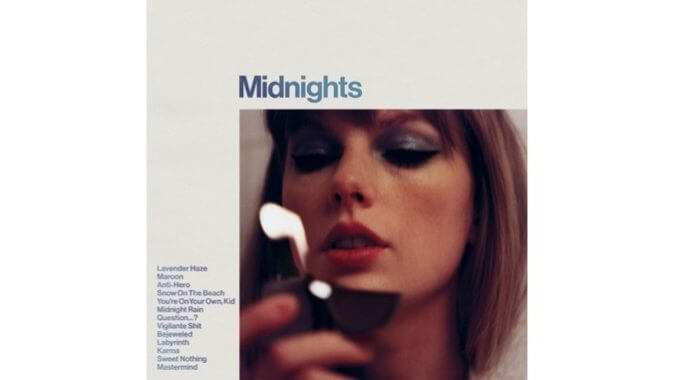Taylor Swift Deals in Dark Magic on Midnights
Swift’s 10th album is a brooding all-night affair, complete with some of her sleekest pop tunes yet

All Taylor Swift thinks about is karma.
As she conceded on Reputation lead single “Look What You Made Me Do,” karma is on her mind 24/7. But for Swift, karma isn’t just how human behavior affects the cosmic order of things. It’s the idea that people’s actions control the narrative. Because Swift has been in the spotlight since she was 16, the story of her career has so often been told for her, and any time she can reclaim that narrative, she does so with gusto. When Scooter Braun bought Big Machine Records and the masters to Swift’s first six records along with it, Swift set out to re-record the albums so she could own her own work. When it comes to the drama first stirred up by Kanye West’s crashing Swift’s speech at the 2009 VMAs, she has opted time and time again for the higher road, dissing West with intention in her songs rather than outright. And when she was scorned for being seemingly apolitical as democracy increasingly fell under siege, she in 2019 released a documentary, Miss Americana, pointing to the roadblocks she faced when trying to speak up—and has become an outspoken voting rights advocate in the years since.
Swift is never not thinking about the big picture, and she returns to the business of image-making on her cryptic and catchy 10th album, Midnights. Where Reputation was an entire record devoted to image and even revenge on those who had defaced her, Swift speaks a more subtle language on Midnights. While it was pitched as something of a concept album—“the stories of 13 sleepless nights scattered throughout my life”—it probably could have been framed like any of her other releases. But Swift knows her all-too-attentive fans (and haters) will assign the album an aesthetic anyways, so why not control the narrative herself? So she shaped these 13 (!) songs into an on-brand all-nighter. That’s what Midnights is. It’s Swift waving the wand.
It’s not news that Swift is particularly fascinated with the bewitching hour. The 2 a.m. timestamp comes up in her music all the time, and as Midnights is perhaps her most self-aware work to date (with some of her best writing to boot), it makes sense that she is just leaning into the whole idea that daytime outcomes hinge on nighttime circumstance. While folklore partner Aaron Dessner is notably absent from Midnights, Swift again joins forces with Jack Antonoff and the pair play to this theme whenever possible, all while expounding on the synth-pop groundwork laid by 1989 in 2014, and further teased out on Lover and Reputation. [Editor’s note: Swift released seven new songs just hours after this review was published, including three featuring Dessner, as part of the “3am Edition” of Midnight.]
“Slick” is not always a word associated with the biggest pop stars in the world, but that’s what Swift is on Midnights. There is actually a song on the album named “Karma,” a track whose existence Swifties have long insisted upon, that features what’s sure to go down as an iconic couplet in Swift’s catalog: “Karma is a cat / Purring in my lap ‘cause it loves me.” She chimes in later on “Vigilante Shit,” “I don’t start shit but I can tell you how it ends,” and applies a “cat eye sharp enough to kill a man.”
-

-

-

-

-

-

-

-

-

-

-

-

-

-

-

-

-

-

-

-

-

-

-

-

-

-

-

-

-

-

-

-

-

-

-

-

-

-

-

-








































